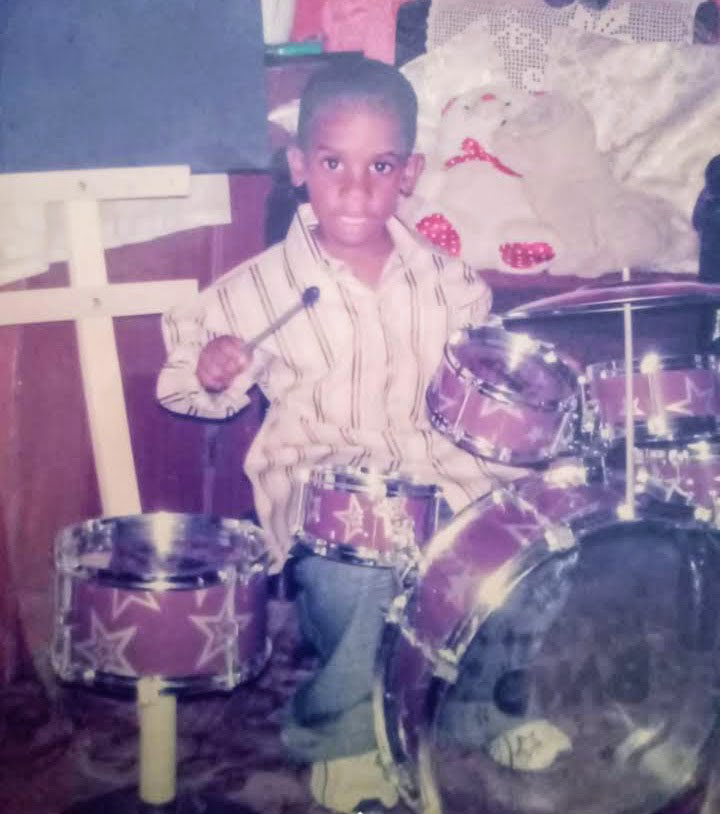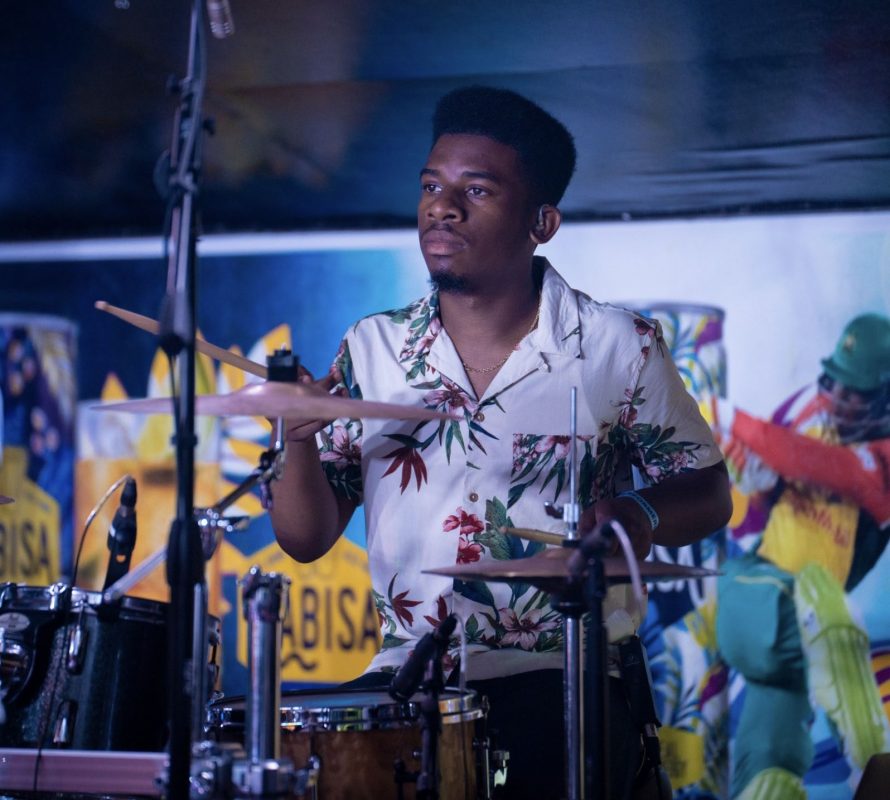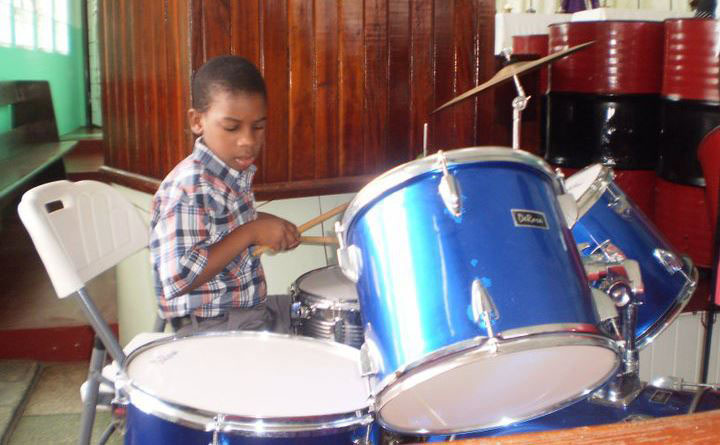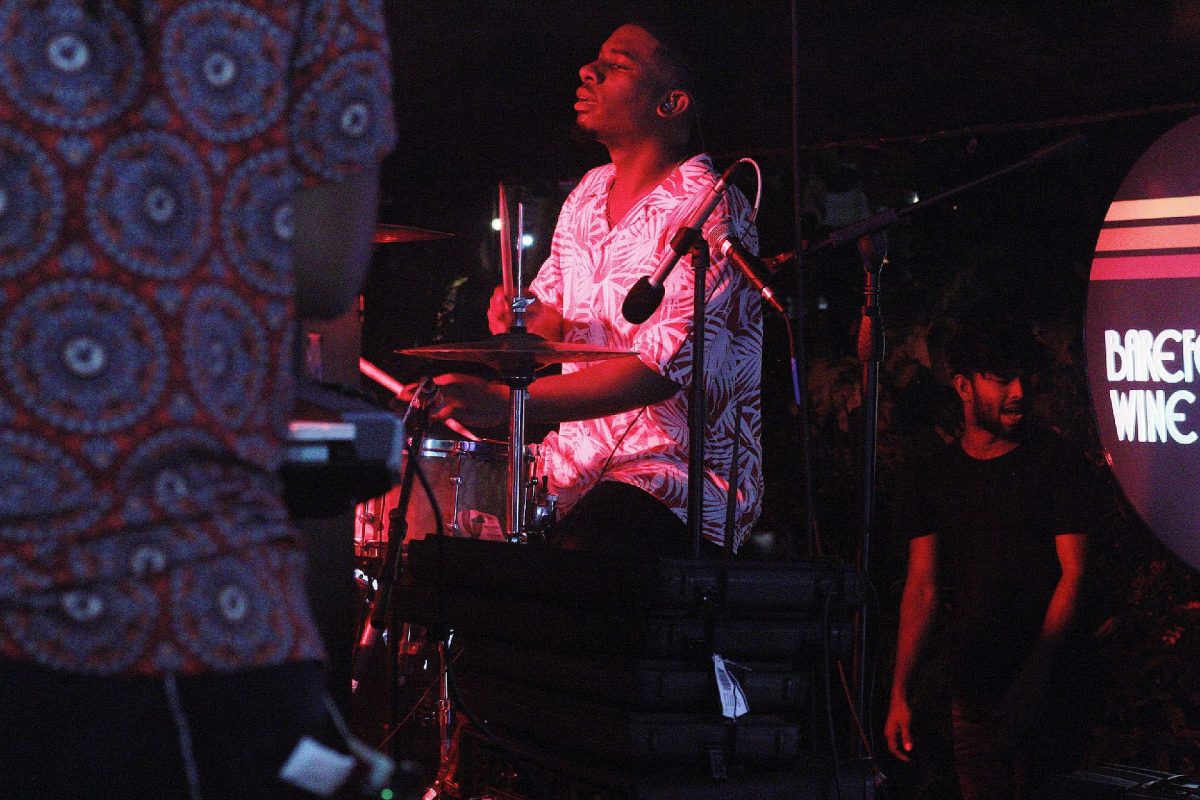“To tell you the truth, I didn’t know I woulda do music for the rest o’ me life, until about two years ago. Music was something in the background of my life, just building,” 22-year old Jaheim Jones said. “Living in Guyana, music to me is a hobby. At no point in time did I think, music is going to be my career.”
Jones, a musician and the main drummer for Shakti Strings Band (a position he held since he was 16 years old), explained that he wanted to feel fulfilled. After trying university and regular employment, he realised the only place he found that sense of fulfilment was through his music.
“As a child, I was always tapping with me hand,” Jones said, tapping his legs to demonstrate. “I don’t know is wha, something just had me like this…” He continued tapping his legs throughout the interview, embodying the rhythm that’s always been part of him.
Jones’s father gifted him his first toy drum set at three years old. He had seen it in the store and asked for it, and luckily, when his father returned, he was able to purchase the last set. He would drum and make rhythms wherever he could, whether it was on his drum set, clothes hung on the line, or his own body. Soon enough, his cousin Johnmark Hannibal, a drummer at Newtown Assembly of God Church introduced him to a real drum set and gave Jones his first drumsticks.
Jones was six years old when his cousin introduced him to real drums and he was focused on lawn tennis, but drumming still consumed his mind. Once his cousin began giving lessons at church, he quit playing tennis to focus on the drums. After a few lessons, on the third Sunday, Hannibal arrived and met a six-year-old Jones playing a rhythm for a female rapper, much to his surprise and that of the congregation. Hannibal would soon migrate, but Jones’s journey did not end there.
At another church he attended, St Sidwells’ Anglican, no one was aware of his skills. One day, he told the band leader that the drums were not fixed properly. The band leader, Damon, asked him how he knew that and then told him to fix them. Jones fixed the drums.
But to play for the church, he would first have to prove himself. He played at a cultural youth event for the Anglican Church. On the drums, he played Usher’s, “OMG” and finished the event off with Beyonce’s “Run the World (Girls)”, much to rapturous applause from the audience and a surprised Damon, who had no idea that such talent came from a child.
‘You could play like duh!’ he recalled Damon exclaiming. ‘All de time you deh in church and you could play play like duh?’
Jones said once he started playing that he was so short that he struggled to sit on the drumming kit. “At this time, when I start to play drums, I really felt good about drumming,” he recalled. “The fun I was having. At the time I used to sleep with me drum sticks under me pillow.” The church had also given him freedom to explore the steel pan and he learned every single pan instrument and was also taught how to read music.
One day, Donald Brooks, an old family friend, asked Jones where he was coming from. “Drumming practice,” was the response. Brooks then asked him where his personal drum set was. When Jones explained he didn’t have one, Brooks promised to get him one. At nine years old, Jones received his first real drum set.
Jones said that being able to play at St Sidwell’s under Damon’s tutelage was extremely beneficial. At nine, he learned to play different chords and listened to conversations with older musicians who had extensive knowledge, which helped fast-track his development. He explained that he was able to hone his craft, especially in playing in a band. “Whenever the band played, many people were surprised that such a small child was able to control and play the drum so well,” Jones said. He added that the church’s band was the first group to be patient with him and give him the freedom to express himself.
Jones further developed his musical talent through playing the steel pan. His father took him to a steel pan competition, and he realised it was a much bigger stage compared to playing at church. The following year, his mother took him, and the year after that, St Sidwell’s Church was invited as a guest band at the competition. At that time, there was a youth band called Pan Waves Steel Orchestra, which was scouting for a new drummer. The drummer had aged out of the youth group and needed someone to understudy him. Once the band heard Jones play, they chose him as their drummer. This was his first experience performing outside of church, and he explained that his musicality became more diverse as he explored various genres of music.
Jones said the leader of the band Cary Gillis was patient with the children in the band and he received further training about his technique and explained that drumming must be disciplined. He said Gillis would arrange all of the music and they had to learn to play his compositions, expanding his musical knowledge. At this point in time, he was still only nine years old.
This band allowed Jones to travel. He went to Suriname and Barbados and was able to play Guyanese folk and cultural music. He began to build his portfolio and at his Primary School Graduation he played a rendition of the pop song “Gangnam Style”. While it was a joy to play at school, he described the experience as nerve wracking especially because he was always shy.
As he grew older, Jones joined Pan Wave’s parent band, Park Side, and started attending concerts, and recording performances when international artists came to Guyana. “I wanted to see real good drummers,” he said. “I wanted to see and feel it at that time.” He would go home and try to play what he heard. Still, even then, he didn’t see music as a professional path—just something he enjoyed as a child.
Then his mom took him to the music school and spoke to Andrew Tyndall after Jones mentioned wanting to join the National Steel Orchestra (NSO). Jones said he already knew how to play, but his main goal was to shadow the NSO’s drummer and learn by watching. He described himself as an upcoming drummer, eager to learn from the best. During one visit, he saw a steel pan player who amazed him. Robert, an excellent player, listened to music on his phone, and as soon as it ended, he started playing it right on the pan. “I was like, wha’ the man jus’ do deh bai?” Jones recalled. “This is magic! This is sorcery! Imagine me as a youth man… see a man listen to a song one time and play it? I was like, I got to learn that.” After witnessing that, Jones said, he pushed himself to improve in pan, training his ear to catch chords—even if he didn’t know the song. His drumming was progressing and everyone was taking notice, Jones said.
Later, Burchmore Simon interviewed Jones when he decided to start a new band sponsored by businessman Brian Tiwari. Jones got the job, but, having lost his phone, he didn’t know and Simon ended up hiring another drummer. Then one day, while hanging out with musicians at the National School of Music, Jones ran into a few band members who assumed he was already in the group and mentioned they had practice coming up. Curious but unsure, Jones showed up and found the other drummer there. It was decided that they would settle it with a drum-off. Jones got the job.
The band began to get music gigs. Jones was still in secondary school, but for the first time he was securing money for his skill in drumming and more gigs kept coming. He credited this band with helping him develop his live performance skills. Jones said all of this experience at such a young age was making him ambitious.
This experience sparked Jones’s ambition to become a music producer. “I was hearing a sick beat playing in the library,” he recalled, describing a session he attended at the National Music School. He was even more surprised to find that it was a dancehall beat—something uncommon at the time. Curious, he asked the musicians what they were up to. Their reply was: ‘We meking beats’.
“Wha yuh mean y’all meking beats?” he asked, intrigued. One of them responded, ‘Man seh budday, hear this rhythm hay suh.’ They explained that they had been making beats on their computer. “I seh yuh could mek music pun yuh computer?” An excited 13-year-old Jones returned home that day to research beat-making. Experimenting with software, he quickly created his first beat, blending it with his growing musical knowledge. For Jones, it was still just fun at that point, but that was the start of his journey into music production.
He began working with his friend Rondell Glasgow, who owned a music studio. Together, they started learning and growing in their craft. During his time at the studio, he produced dozens of tracks. One day, he received a phone call from me. I was looking for someone to compose music for my film.
Jones’s grandfather was a cinephile and he spent hours with him watching movies and absorbing the soundtracks. “As a child, I watching a lot o’ movies and hearing a lot o’ soundtracks. Meeno, by watching all o’ dem movies, I building meself to become a film composer,” Jones said. He added that every Friday after school, he would buy DVDs with the money he earned from music gigs. He liked some of the composers, but only started researching them when he began scoring films. When the opportunity to compose a film score came along, Jones felt ready, drawing on his background and realising he had the ability to compose orchestral pieces that could truly move people. Now, he says he’s at a point in his life where he’s creating music he genuinely wants to listen to.









